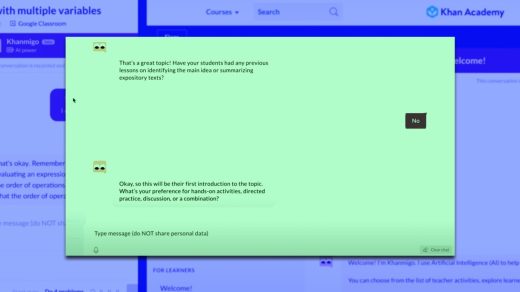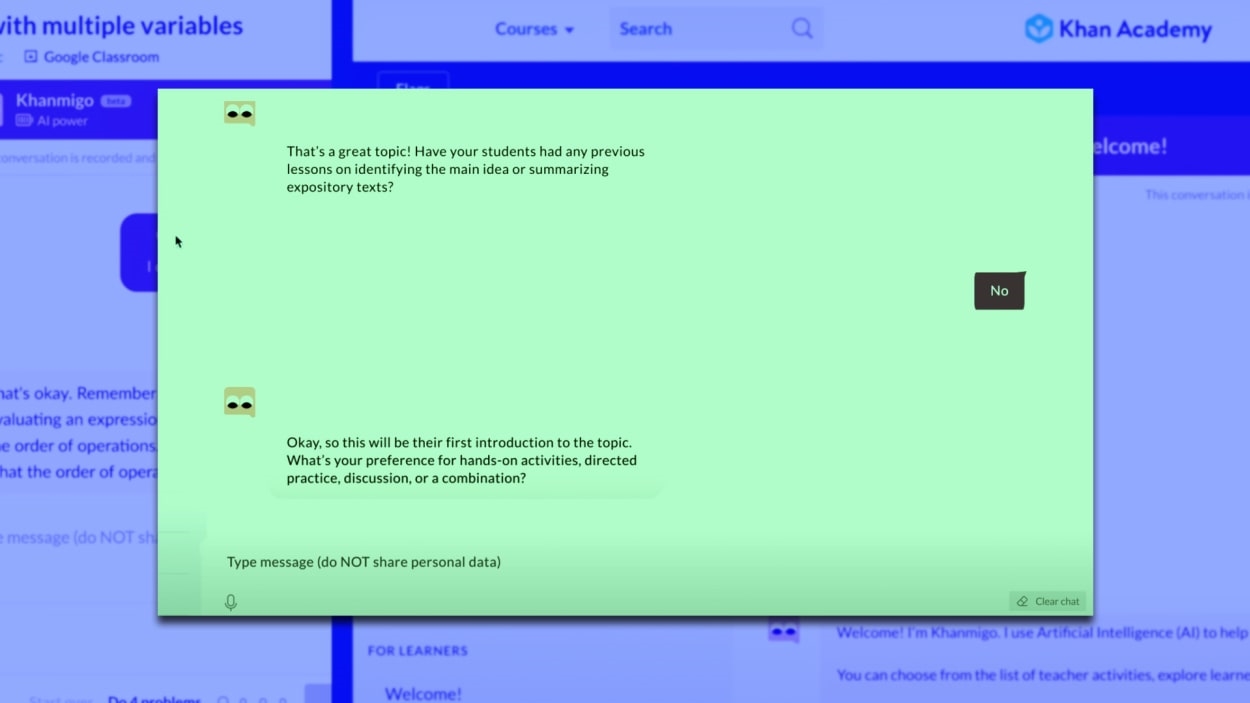Learning nonprofit Khan Academy is piloting a version of GPT called Khanmigo
Sal Khan, founder and CEO of online learning nonprofit Khan Academy, wants to turn GPT into a tutor.
Khan Academy is testing a carefully managed version of OpenAI’s GPT that can help guide students in their studies, not enable them to cheat. A pilot is currently running with a handful of schools and districts to test the software, and Khan hopes to open a wider beta this summer.
“I strive to be at the cutting edge of how AI, especially large language models, can be integrated to actually solve real problems in education,” Khan says.
Many students are already using ChatGPT and other generative AI tools to assist with their homework—sometimes against their teachers’ wishes. Khan Academy’s approach stands out because it’s designed to answer students’ questions without giving away the answers, and to integrate with the organization’s existing videos and exercises.

In a demonstration for Fast Company, Khan showed how the chatbot, dubbed Khanmigo, can guide students through math problems, help debug code, serve as a debate partner, and even engage in conversation in the voices of literary characters like Hamlet and Jay Gatsby.
The project began last June, when Khan received an introductory email from Sam Altman and Greg Brockman, OpenAI’s CEO and president, respectively. The two offered a private demo of the AI software, and Khan was impressed with the program’s ability to answer questions intelligently about various academic materials.
Khan soon found himself spending late nights experimenting with prompts to the software that would have it take an educational role. “I was pulling all-nighters, getting it to act like a tutor, getting it to take on different personas, getting it to develop lesson plans,” he says.
Khan Academy, which began in 2008 as a series of engaging educational videos posted by Khan to YouTube, has made a name for itself with online instructional materials covering everything from math and coding to art history and English grammar, all available for free and supported by donations and grants. The organization has a team of more than 150—about half of whom, Khan says, are now working in some capacity with AI tech.
Rather than having students and teachers interact with general-purpose ChatGPT, Khan Academy gave the AI model additional training and crafted custom prompts for specific situations, so Khanmigo can appear alongside existing videos and assignments. For instance, when Khanmigo is deployed with a video, the AI system has access to the entire transcript of the video; math-related interactions are designed to include special prompts to ensure the AI carefully reasons through a problem before simply spitting out an answer to a student’s question.
The AI can also spot issues with students’ programming code likely faster than most human instructors would—something Khan says is potentially especially useful for students who have limited access to expert coding teachers—and it’s prompted to lead students in the right direction rather than simply providing an answer or telling them they’re right or wrong. (In a locked teachers’ mode, similar to teachers’ editions of textbooks, the bot can be more direct about revealing answers.)
“We’ve prompted our way so that Khanmigo has a humility about it,” Khan says. “It actually doesn’t just say ‘You’re wrong,’ it says ‘That’s not what I got, can you explain your reasoning?’”
That approach can be beneficial in math settings where, Khan admits, the AI model isn’t yet 100% accurate, though he says the accuracy ramps up dramatically when it’s prompted to explain its work before presenting an answer to the student. “It’s not perfect,” he says, “but it’s still pretty magical at the same time.” The system is trained to deflect or refuse if students simply ask it to do their homework for them.
Khan says there’s also a second AI that monitors students’ interactions with Khanmigo to make sure conversations don’t go anywhere “shady.” If anything untoward seems to be going on, the system can shut down the interaction and notify parents and teachers.
Khan hopes to be able to roll out the system more broadly within the next few months. Right now, individuals can enter a wait list to try Khanmigo, with those who are selected to test the product asked to commit to at least a $20-per-month donation. “Rest assured that bringing down this cost and making Khanmigo more accessible to a broader audience is something that everyone on the team wants to happen,” the company explains in its FAQ.
Final pricing for individuals and school systems, and limits on how much users can access the chat system, remain to be determined. Philanthropic funding, along with potential membership programs that let users pay for others’ access, could also help cover costs, Khan says, noting that some schools have indicated they’d be willing to pay a per-student fee, especially since they already pay for human tutoring.
Khan also envisions future iterations of Khanmigo having features like long-term memory for interactions with users; the competence to provide feedback and coaching on student writing; and the ability to host multiuser interactions, like moderating a student debate. At some point, the chat interface may even be the main interface people use to interact with Khan Academy, he suggests, adding, “I think it dramatically transforms what Khan Academy is going to become.”
(27)



